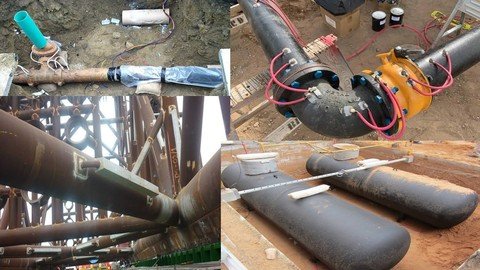Cathodic Protection Corrosion Control System

Free Download Cathodic Protection Corrosion Control System
Last updated 5/2024
MP4 | Video: h264, 1920×1080 | Audio: AAC, 44.1 KHz
Language: English | Size: 2.62 GB | Duration: 5h 1m
CP design fundamental ,Cathodic Protection Criteria, Galvanic (Sacrificial) anodes systems, Impressed Current Systems
What you’ll learn
Corrosion Introduction
Driving Force for Corrosion and The Pourbaix Diagram
Reference Electrodes types and uses
Corrosion Cell Kinetics (Polarization) definition , factor affecting and Evans diagram
Cathodic Protection Criteria
Galvanic (Sacrificial) anodes systems
Impressed Current Systems
CP Design Fundamentals and 2 case study
Requirements
student, Engineering, technicians, fresh graduate , cathodic protection operator
Description
Corrosion is one of the most important problems encountered by the owners and operators of underground, offshore, submerged and other metallic structures exposed to an electrolyte. If corrosion is not controlled, it can lead to large costs in repairs or facility replacement. Even greater costs can be incurred from environmental damage, injuries and fatalities.Corrosion control personnel must have a good basic understanding of corrosion mechanisms. They also need to know the various conditions under which corrosion can occur on underground facilities. In this course, we will focus on the control of metallic corrosion by applying cathodic protection. This course was developed for cathodic protection field technicians, although this knowledge is also needed by corrosion engineering personnel. Cathodic protection (CP) is a corrosion-control technology that involves making a metal surface the cathodic side of an electrochemical cell. Connecting the metal to be protected with a more readily corroded metal to act as the anode of the electrochemical cell is the easiest way to apply CP. In theory, cathodic protection can be used to protect any metallic structure in contact with a bulk electrolyte. However, it is most commonly used to protect steel structures buried in soil or submerged in water in practice. Cathodic protection systems protect a variety of metallic structures in various situations. The most prevalent are water and fuel pipelines, storage tanks, ships and boats, offshore oil platforms, oil well casings, and other applications. This chapter will go through the fundamental principles of cathodic protection and current advancements in the field.
Overview
Section 1: Introduction
Lecture 1 Introduction
Section 2: Corrosion Introduction
Lecture 2 Corrosion Introduction
Lecture 3 Driving force for corrosion
Lecture 4 Reference Electrode
Lecture 5 The Pourbaix Diagram
Section 3: Corrosion Cell Kinetics (Polarization)
Lecture 6 polarization part1
Lecture 7 Polarization part2
Lecture 8 Polarization part3
Section 4: Cathodic Protection Criteria
Lecture 9 Cathodic Protection Criteria part1
Lecture 10 Cathodic Protection Criteria part2
Section 5: Cathodic Protection Systems
Lecture 11 Galvanic (Sacrificial) anodes systems
Lecture 12 lecture 7 part 2 (Galvanic (Sacrificial) anodes systems)
Lecture 13 lecture 8 ( Impressed current system)
Section 6: Cathodic Protection Design Fundamentals
Lecture 14 CP Design Fundamentals part1
Lecture 15 CP Design Fundamentals part 2
Lecture 16 CP Design Fundamentals part3
Lecture 17 CP Design Fundamentals part4
Engineer and technician working in Cathodic Protection Corrosion Control System
Homepage
https://www.udemy.com/course/cathodic-protection-corrosion-control-system/
DONWLOAD FROM RAPIDGATOR
rsawa.Cathodic.Protection.Corrosion.Control.System.part3.rar.html
rsawa.Cathodic.Protection.Corrosion.Control.System.part1.rar.html
rsawa.Cathodic.Protection.Corrosion.Control.System.part2.rar.html
Fikper
rsawa.Cathodic.Protection.Corrosion.Control.System.part1.rar.html
rsawa.Cathodic.Protection.Corrosion.Control.System.part2.rar.html
rsawa.Cathodic.Protection.Corrosion.Control.System.part3.rar.html
